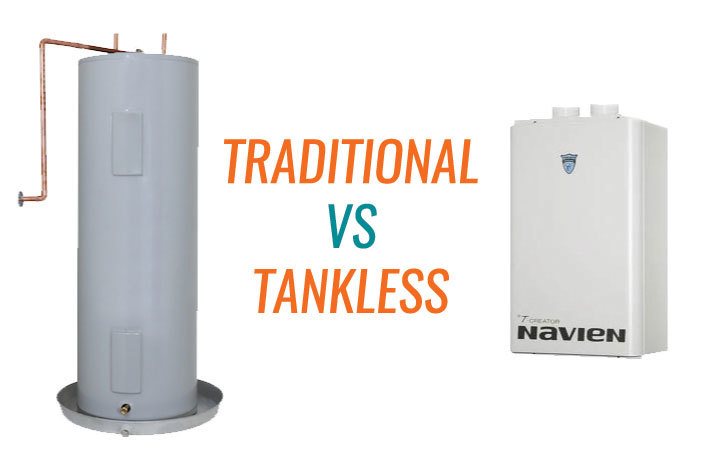Tankless vs Traditional Water Heaters – Pros & Cons

Compare the differences between Traditional vs. Tankless water heaters.
Your water heater is an essential part of your home’s mechanical system. The words, “There’s no hot water!” preceded by a shriek from the shower, are not something you want to hear from your teenage daughter as she’s getting ready for school in the morning!
According to the American Water Works Association, The average American family uses 45-65 gallons of water per person, per day. And 20-30 gallons of that water is the heated variety — hot water for showers, baths, dishes, laundry, etc.
We depend on our water heater for all of these activities every day of every week. It’s precisely because it’s such a valuable piece of equipment, that when something goes wrong with it, it can feel like a catastrophe!
Sooner or later, every homeowner faces the prospect of having to replace a failed or aging water heater. When that day arrives, which will you choose — one of the new tankless water heaters or a traditional model? Here’s some helpful information on tankless vs. traditional water heaters to help you decide before you actually need to replace yours.
Differences Between Traditional & Tankless Water Heaters
A traditional water heater has a tank that stores and pre-heats anywhere from 30 to 50 gallons of water at a time to use for showers, laundry, etc. Once that hot water is used, the tank starts all over again, refilling and pre-heating another 30-50 gallons.
A tankless water heater doesn’t store any water. Rather, it uses gas or electricity to warm the water as it’s needed. It’s an “on demand” system.
Now let’s look at the pros and cons of each …
Traditional Water Heater Pros
- Lower initial installation cost
- Low venting cost
- Easy to maintain
- Easy to replace
- Still works during power outage (gas powered)
Traditional Water Heater Cons
- Limited amount of hot water available at one time
- Higher energy bills in the winter
- Shorter life compared to tankless water heaters
- Freshness of water – water that is in the tank a while can collect corrosion and rust
- Space – The tank takes up more room than a tankless version
- Over time, the tank could get a leak
Tankless Water Heater Pros
- Never run out of hot water
- Less energy to operate
- Higher efficiency meaning monthly savings on energy bills
- Space-saving
- Lasts longer than a traditional water heater – up to 20 years
Tankless Water Heater Cons
- Higher initial cost
- Basically serves one tap at a time, making it impossible for a person to have a hot shower while the washer is filling with hot water
- Runs on electricity and won’t work during a power outage
It all comes down to the needs of your family and your priorities. If you need a water heater and don’t want to spend more initially, a traditional water heater may be a better choice. If, on the other hand, you prefer your hot water “on demand”, and don’t mind the higher up-front costs, the tankless version may be the right choice for you.